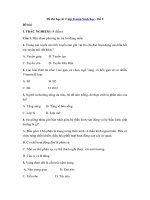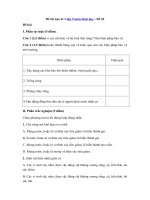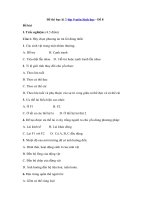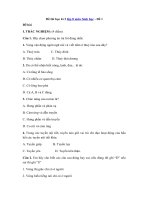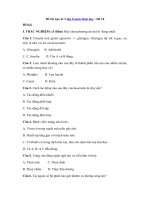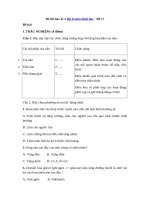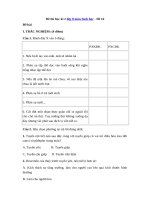Đề Thi Trắc Nghiệm Tiếng Anh B1 Đại học Bách Khoa Có đáp án
Bạn đang xem bản rút gọn của tài liệu. Xem và tải ngay bản đầy đủ của tài liệu tại đây (630.41 KB, 49 trang )
PREPARATION FOR LEVEL Bl
COMMON EUROPEAN FRAMEWORK OF REFERENCE FOR
LANGUAGE
Overview of the exam
Paper
Name
Timing
Content
f-----+------f-------+----------------------------j
Paper
1
Reading
and
90
minutes
Writing
Reading: 4 parts which test a range of reading
skills
including
sentence
multiple-choice question
completion,
on short notices,
labels, notes, messages, postcards or emails,
reading comprehension and gap fillings
Writing: 2 parts which test writing skills
ranging from producing variations on simple
sentence to a 100-word piece of continuous
writing.
1-------t--------+-----+--------------------------··---··--
Paper
Listening
2
15
minutes
2 parts which include picture describing and
gap fillings.
---------- -------t--------t---- --------------------
Paper
3
Speaking
10- 12
3 parts which include asking and answering
minutes
questions, discussing and expressing opinions
L--- ------L----- ---------------------------J
1
READING
Unit 1
SENTENCE COMPLETION
Sentence completion measure your understanding of basic grammar. There are 10 incomplete
sentences in this part of the test. This question type presents a sentence with a blank. From four
possible answer choices, you will select the one word or phrase that correctly completes the sentence.
Here are some examples:
1. The company had dumped waste into the river for years and it
B. planning
A. plans
to continue doing so.
C. planned
D. had planned
2. After the female emperor penguin lays a single egg, she gives them to her mate,
it in a fold of skin near his feet for a two-month incubation period.
C. which
B. who
A. he
Answers: 1. C
D. while
2. B
Inventory of grammatical areas
Verbs
Regular and irregular forms
Modals
Tenses
Verb forms
Compound verb patterns
Conditional sentences
Simple reported speech
Nouns
Pronouns
Determiners
Adjectives
Adverbs
Prepositions
Connectors
Practice
Circle the letter next to the word or phrase, which best completes each sentence (A, B, C, D).
1. Neither Jane nor her brother -----consent from for tomorrow's field trip.
A. need
2. No child
A. before
3. There
A. was
C. is needing
B. needs
the age of sixteen will be admitted to see this film.
B. except
C. lacking
D. below
considerable improvements in agriculture since World War II.
B. were
C. has been
D. have been
4. Our flight from Hanoi to Ho Chi Minh City was delayed
A. because of
D. has need
C. on a account
B. because
2
there was a heavy storm.
D. as result
holds
\
5. They
all day swimming and sunbathing at the beach.
A. passed
B. used
C. spent
D. occupied
6. Approximately 500 varieties of insectivorous plants, which trap animals for their
sustenance, ----in the world.
A. that exist
B. exist
7. My teacher told us that the school
A. was building
B. was built
C. they exist
D. and their existence
in 1946.
C. has been built
D. is built
8. The facilities of the older hospital
_
A. is as good or better than the new hospital
B. are as good or better than the new hospital
C. are as good as or better than the new hospital
D. are as good as or better than those of the new hospital
9. Ozone is formed when ultraviolet radiation from the sun
------
molecules
into highly reactive oxygen atoms.
A. oxygen breaks up
B. oxygen is broken up
C. to break up oxygen
D. breaks up oxygen
10. The cyclist
he crossed the main street.
B. looks cautious when
A. looked with caution after
D. had looked cautiously before
C. was looked cautious when
11. Here
notebook and report that I promised you last week.
A. is the
12. It.
A. rained
B. are the
C. was the
for two days when I arrived in town.
C. has been raining
B. rains
13. He is very stubborn, so it will be difficult to
B. suggest
A. persuade
14. Life here is very
B. peacefully
15. It's three years
him to go.
C. make
D. prevent
C. peace
D. peacefulness
Mr.. Smith.
A. that I don't see
16. My father asked me
B. that I haven't seen C. since I didn't see
D. since I last saw
of the film.
A. what do you think B. what I think
C. what did you think
17. Dogs are good traveling companions. They will go
18. Cuba is
D. had been raining
_
A. peaceful
A. whichever
D. has been a
B. wherever
C. whatever
sugar growing areas in the world.
4
D. what I thought
you take them.
D. whenever
A. one of the larger
B. one of largest
5
C. one of the largest
D. largest
19. The skiers would rather
through the mountains than go by bus.
A. travel by train
B. traveled by train
C. to travel on train
D. traveling by the train
20. Of the two new teachers, one is experienced and
_
A. the others are not
B. the other is not
C. another is inexperienced
D. other lacks experience
21. The teacher, as well as the students,
A. were
22.
happy about the test result.
B. are
C. is
D. has
little we may like it, old age comes to most of us.
A. Despite
23.
B. However
C. So
D.As
an insurance agent it is necessary to pass the state examination.
A. Become
B. To become
24. In recent years, more and more people
A. pay
B. paid
25. Please don't be so
D. One becomes
for things with credit cards
D. have been paying
C. are paying
. I can't do all the work by myself.
A. unreasonable
B. reasonable
26. I don't like his stories,
A. that
D. reasonably
C. reason
have unhappy endings.
B. they
27. We are
C. Having become
D. who
C. which
of the long journey.
B. tiring
A. tire
D. to tire
C. tired
28. Pioneer men and women endured terrible hardships, and
_
A. so do their children
B. neither did the children
C. also the child's
D. so did their children
29. Last year, Matt earned
his brother, who has a better position.
A. twice as much as
B. twice more than
C. twice as many as
D. twice as more as
30.
American landscape architect was Hideo Sasaki.
A. The most famous one of
B. Of the one most famous
C. One of the most famous
D. The one most famous of
31. Most people enjoy
A. to travel
to different parts of the world.
B. travel
32. Your hair is long. It needs
A cutting
33. I helped my students
C. traveling
D. traveled
C. cut
D. has cut
_
B. to cut
their homework.
A finish
B. finishing
C. finished
D. have finished
,
34. This encyclopedia costs
one.
A. twice more than
the other
B. twice as much as
C. twice than
35. We are looking forward to
school.
A. go
back to
B. going
36. Just keep
D. more than
C. went
D. have gone
on the baby while I cook the supper, will you?
B. a
C. an
D. a care
glance
eye
A. a
look
37. Marry does her homework
her classmates
A. more careful
than
D. more carefully
B. as carefully
C. carefullier
D. In spite of
38.
the wet weather, the football
match went ahead
A. Although
D. seeing
B. Owing to
C. However
39. Please go in, Mr. Jones is free
now.
A. sees
40. The
feel sick.
A.
vie
w
you
B. will see
C. to see
of blood always makes him
B. scene
D. sight
C. form
41. I wonder who drank all the milk yesterday. It
was out all day.
C. could
A. can't
have been Jane because she
D. needn't
B. must
42. If we had known your new address, we
A. came
will come
to see you.
C. would come
B.
5
D. would have come
43. "I don't want to go out for a holiday", she said; "I'd rather
at home"
D. will stay
A. stayed
B. stay
C.
have stayed
44.
D. Although
it was raining heavily he went out
without a raincoat.
A. In spite
However
45. She
money.
B. In spite of
C.
D. warned
him of wanting to marry her for her
A. cursed
blamed
B. accused
46. The guide walked so
A. fast
C.
that most of the party could not keep up with him.
B. quick
C. rapid
D. lively
47. You will never finish that job by tomorrow morning unless you.
help.
A. will get
B. would get
C. get
48. She gives her children everything
A. that
..;.;. Put piants
A. near to
D. will have got
they want.
B. who
C. whom
D. what
a window so that they will get enough light.
B. near of
C. next to
50. Your brother used to visit you quite often,
A. didn't he
some
B doesn't he
?
C. wouldn't he
5
D. nearly
D. hadn't he
Unit 2
SHORT MESSAGES
In the exam
In part 2 of the reading test you will read five short notices, labels, notes,
messages, yostcards or email.and answer a multiple-choice question on each one.
In this unit
/Different words, same meaning
/Introduction to multiple-choice
/What's on the notice board?
/Practice with multiple-choice questions
(To start you thinking ....about notices
)
1. Look at these labels and notices; decide what they are connected with. Write the
letter under the correct heading below.
Drink
Food
Clothes
Medicine
a
d)
-
a. Shake well
before serving
b. Once open, eat
with three days
d. Adults and
children over 12
take 1-2 tablets
with water
f. Place the bag in a
cup and leave for 5
minutes
e. Do not drink.
Avoid contact with eyes
g. Wash dark
color separately.
c. Suitable for home freezing.
Freeze on day of purchase
( Different words, same meaning
)
2. For multiple-choice questions, you need to understand that the same information can
be expressed in different ways.
e.g. keep closed
is the same as
Never leave open
You're not allowed to smoke
Smoking is forbidden
is the same as
)'tr ,r/JA'Jh.'Ci
6
Complete these sentences with one or two words so that the second sentence means the
same as the first.
(,
A. Not suitable for use on,..plastic surface. = Qqn 'f
use on plastic surface.
B. Keep medicine ouo.fPeagfrof children. =Make sure childrentAa
get the medicine
C. Don't walk on gr ss.
= Keep q?
the grass
D. No e try without permit.
=You can't enter if you k{;have a permit
= Only people
permits can enter.
1\.-l.f.
E. Maximum capacity 50 passengers.
=No f"ti.AI.Lthan 50 passengers allowed
=Up
50 passengers only.
F. Not to be given to children under 12. =You fYIA..fl:, rgive it to children less than
12 years of age
G. Closed until 8.00 am.
8.00 am.
=The shop will be open r ,(
H. Low ceiling. Mind your head.
=Be C&A ..{ d because he ceiling is low.
( Introduction to multiple-choice
)
3. Read these notices.
First answer the questions in italics for each notice- they'll help you choose the correct
multiple-choice answer. (Question 1-2 have only two choices and question 3-4 have three
choices). Circle the correct answer.
I.
Important: Please read the instruction book Do you have to use this instruction book, or
before using the machine
is it just a good idea?
A. This machine can not be used without the instruction book
B. This machine should only be used after you've read the instruction book
2.
Please switch off the lights and lock
The door when you leave
'-------:----::::----::---:--..,------,------,-,------,-----=-=--
,A: Before leaving,
Which action must you do first when leaving?
J
turn the light off
B. Before leaving, lock the door
3.
No entry except with a valid permit which
can be bought from the Town Hall
Why would you go to the Town Hall?
.A; If you want to come in, you must have a permit
B. You must go to the Town Hall if you have a permit
C. You need a permit if you want to enter a Town Hall
4.
Accident here at 6.00 pm. On Sunday 25th
Who do the police want to speak to?
September. Please contact police on
3569087 if you saw anything
A. The police would like to speak to people on September 25th
B. The police want to speak to people who had an accident on September 25th
C. The police want people to tell them if they saw the accident on September 25th
7
I
I
What's on the notice board?
-
7--
-
1/
4. All these notices and messages are on a college notice board.
H.ead them quiddy .>nd then 'vrite the number of the notice after a- f.
a.
b.
c.
d.
e.
f.
You want to contact a student who used to be in your class.
You have found a bag in the ladies' toilets.
You don't understand the new Word for Windows computer programme.
You need to earn some money, but not on Saturday or Sunday.
You want to take some exercise in the evenings.
You need to know where your class will b e .
- - - -------------
1. For sales
Grafta acoustic/electric
guitar, hardly used! Only 4
months old. Bargain at half
original price. £100 for
quick sale. Cash only -sorry
no cheques ( ::, J
4. Computer problems
IT support for home
computers. We can
provide hardware/
software support for
almost all models of
PCs (sorry no Macs).
Fast and cost
efficient service.
/
2. Room to let
y 3. Tai Chi \ c.,..'!-In friendly shared
exercise class
Introductory
house near college
10-week
campus, on cit'l, c 't.,E1.d
beginners
bus route. Avad e
5
course starting
October 1 t. £225 per
7.00 pm.,
\._month + b.l.[!s.._.,...:p4 / September 30th
5. Local family
wants baby sister
for weekends and
some evenings £5
(lu·
'-......
/
6. Freshgro
---------------Anyone found a blue
\ rucksack? Last seen on
7. EMAIL
Monday. Please honest
From: Antonie Pinto
students, my life's
To: everyone, room 201B
work in it! Contact:
Haven't heard from you- How's
Claudia 0224 569134
everything? For next month
only my address is:
\.
After
9. Important ·
that my usual one
at Town Hall. For
enrolment
details, pis
phone 236689
or just come
along on the day
'\
an hour some
experien e1
I/8. Lost
+)
Will now open 24 hours.
People needed to work
midnight to 6.00 am. Mon
Fri. Some heavy lifting work
included. Apply to store
manager.
Dr. Fox's European History class will be in Block B.
not room 43, tomorrow only (Wednesday). Pis
tell your classmates.
-------------/ Room 36,
In the exam, it's important that you understand what the notice or message is saying
before you answer the multiple-choice question. Read notices 1-9 again. And answer
these following questions.
.
IS
.
.
.
de
Notice 1: Why the seller askmg such a low pnce? ( q-vt
S
Notice 2: Will the accommodation cost more than £225 per month? Why? ';
Notice 3: To join a class, is it necessary to :elephone first? /II S;,t ..J.-. .,.._
1
(
lk- !Ve-.rz- 5
-t,.;, ·
9
L ·
"T7
.10 t'f-
J.
.
I
t-n
d"'j/
_.? rllu
,
f bllJ
1
--&,,.) Wl't;l, ffe-.
rj.,./v ..£- "- p '(11 rL 1
. 5- LtvtNotice 4: Why would you be interested in this service? /
Notice 5: What is an important thing for the advertiser?
Notice 6: Why are Freshgro advertising?
k
Notice 7: Why is Antonie Pinto sending this email address?
J
pt»
If
, sdfr'7l
r. f"''
t/5' -W JiJ
)6--vfl'>f1
ik-·
J?
1
Notice 9: Where will Dr. Fox's European History class be on Friday ;
Practice with multiple-choice questions
5. Answer these multiple-choice questions about the notices and messages.
Notice 1: A. The seller wants to get some cash quickly.
B. The seller has played his guitar a lot.
C. The seller is hoping to get more than £100 for the guitar.
Notice 2: How much will the accommodation cost?
A. £225 per month
B. £225 per month plus bus fares
More than £225 per month
Notice 3: A. It's important to reserve your place in advance.
B. It's not necessary to reserve your place.
C. You must reserve your place on the day.
Notice 4: You might be interested in this service if you
A. have a Mac computer which sometimes has problems.
B. sometimes have difficulty using your PC.
C want to buy some new software from this company.
Notice 5: A. To do this job you must like babies very much.
It If you want the job, you must have done babysitting before.
C. You have to be free every evening for this job.
Notice 6: A. Freshgro is looking for a store manager.
B. There are problems for people who work at Freshgro
C. Freshgro have increased their opening hours.
Notice 7:
b- Antonio wants his friends to know how to contact him.
B. Antonio's friends must write to him this month
C. Antonio thinks his friends have lost his address.
Notice 8: A. Claudia wants her rucksack back with or without the things inside.
B. Claudia is afraid that not all students are honest.
C. Claudia is worried about losing all her notes and papers.
Notice 9:
Dr. Fox's European History class will
A. no longer be on Wednesday
B. be in different room from now on
change room for tomorrow
13
rvz..e_
ne't "J
•
hi
M
LA>?
'If
#t
r+r
dtl7 l
k1
. ·
Unit3
READING COMPREHENSION
In Part 3 of the Reading test is the Reading Comprehension section. In this part of the test
you will read a text and answer five multiple-choice questions, and you will be asked two
types of questions about the text.
I. Reading Comprehension questions ask you to answer questions about the information
given in the reading passages. There will be a variety of questions about each text, including
main idea questions, directly answered detail questions, and implied detail questions.
2. Vocabulary questions ask you to identifY the meanings of vocabulary words in the text.
I. Reading Comprehension questions
STRATEGIES FOR THE READING COMPREHENSION QUESTIONS
1. Skim the text to determine the main idea and the overall organization of ideas in the text.
You do not need to understand every detail in each passage to answer the questions correctly.
It is therefore a waste of time to read the text with the intent of understanding every single
detail before you try to answer the questions.
2. Look ahead at the questions to determine what types of questions
answer. Each type of question is answered in a different way.
you must
3. Find the section of the text that deals with each question. The question-type tells you
exactly where to look in the text to find correct ans ers.
* For main idea questions, look at the first line of each paragraph.
* For directly and indirectly answered detail questions, choose a
key word in the question,
and skim for that key word (or a related idea) in order in the text.
* For vocabulary questions, the question will tell you where the word is located in the
text.
4. Read the part of the text that contains the answer carefully. The answer will probably be in
the same sentence (or one sentence before or after) the key word or idea.
5. Choose the best answer to each question from the four answer choices listed in your test
paper. You can choose the best answer according to what is given in the
appropriate section of the text, eliminate definitely wrong answers, and mark your best guess
on the answer sheet.
There are some types of questions in the Reading Comprehension section of the test.
You should be familiar with them.
1. MAIN IDEA QUESTIONS: The answer to this type of question can generally be
determined by looking at the first sentence of each paragraph.
The following chart outlines the key information that you should remember about
main idea questions:
Egyptian Art
Five thousand years ago, Egyptian art was the most advanced art ever known. The ancient
Egyptians created many great works of art. Egyptian art is most famous for great paintings,
statues, pottery and unique buildings. The Egyptian artists tried to make art that accurately
showed humans, the world and their spiritual beliefs. The artists were so skilled that many
..:xzunplcs of Egyptiau an ::;till exist today, like the Sphinx arid the Pyramids. They even used
painted pictures and symbols, called hieroglyphs, to write with.
What is the main point of the passage?
(A) Egyptian art was very beautiful and unique.
(B) Egyptians used art to show their symbols.
(C) Egyptian art was the same as other cultures.
(D) Egyptians were skilled at only one type of art.
2. Sl'ATED DETAIL QUESTIONS: The answers to these questions are found in
order in the passage.
Ice ages, those periods when ice covered extensive areas of the Earth, are known to
have occurred at least six times. Past ice ages can be recognized from rock strata that show
evidence of foreign materials deposited by moving walls of ice or melting glaciers. Ice ages
can also be recognized from land formations that have been produced from moving walls of
ice, such as U-shaped valleys, sculptured landscapes, and polished rock faces.
The passage covers how many different methods of recognizing past ice ages?
(A) One
(B) Two
(C) Three
(D) Four
3. "UNSTATED" llETAIL QUESTIONS: The answers to these questions are
found in order in the passage.
Blood plasma is a clear, almost colorless liquid. It consists of blood from which the
red and white blood cells have been removed. It is often used in transfusions because a
patient generally needs the plasma portion of the blood more than the other components.
Plasma differs in several important ways from whole blood. First of all, plasma can be
mixed for all donors and does not have to be from the right blood group, as whole blood does.
In addition, plasma can be dried and stored, while whole blood cannot.
All of the following are true about blood Plasma EXCEPT
(A) it is a deeply colored liquid
(B) blood cells have been taken out of it
(C) patients are often transfused with it
(D) it is generally more important to the patient than other parts of whole blood
4. FIND PRONOUN REFERENT QUESTIONS: the line where the pronoun is located is
generally given in the question. The noun that the pronoun refers to is generally found before
the pronoun.
The full moon that occurs nearest the equinox of the Sun has become known as the
harvest moon. It is a bright moon which allows farmers to work late into the night for several
nights; they can work when the moon is at its brightest to bring in the fall harvest. The
harvest moon of course occurs at different times of the year in the northern and southern
hemispheres. In the northern hemisphere, the harvest moon occurs in September at the time
15
of the autumnal equinox. In the southern hemisphere, the harvest moon occurs in March at
the time of the vernal equinox.
1. The pronoun It refers to
(A) the equinox
(B) the Sun
(C) the harvest moon
(D) the night
2. The pronoun they refers to
(A) farmers
(B) nights
(C) times ofthe year
(D) northern and southern
5. IMPLIED DETAIL QUESTIONS:
The answers to these questions are found in order in the passage.
Eskimos need efficient and adequate means to travel across water in that the areas
where they are surrounded by oceans, bays, and inlets and dotted with lakes and seas. Two
different types of boats have been developed by the Eskimos, each constructed to meet
specific needs.
The kayak is something like a canoe that has been covered by a deck. A kayak is
generally constructed with one opening in the deck for one rider; however, some kayaks are
made for two. Because the deck of a kayak is covered over except for the hole (or holes) for
its rider (or riders), a kayak can tip over in the water and roll back up without filling with
water and sinking. One of the primary uses of the kayak is for hunting.
The umiak is not closed over, as is the kayak. Instead, it is an open boat that is built to
hold ten twelve passengers. Eskimos have numerous uses for the umiak which reflect the size
of the boat; "the umiak is used to haul belongings from campsite to campsite, and it is used
for hunting larger animals that are too big to be hunted in a kayak.
1. It is implied in the passage that if a kayak has two holes, then
(A) it accommodates two riders
(B) it is less stable than a kayak with one hole
(C) it is as large as an umiak
(D) it cannot be used on the ocean
2. It can be inferred from the passage that an example of the animal mentioned in the last
paragraph might be
(A) a kangaroo
(B) a snake
(C) a whale
(D) a salmon
II. Vocabulary questions
Vocabulary questions ask you to identifY the meanings of vocabulary words in the
reading passages. To answer these questions, you may have to know the meanings of the
words. You can also identifY the meanings of some ofthe words by understanding the context
surrounding the words, by using structural clues to identifY the meanings of the words, or by
breaking down the unknown words into known word parts in order to identifY them.
There are skills that you can use to help you find the correct answer to the question:
(I) finding definitions from structural cues, (2) determining meanings from word parts, and
(3) using context clues to determine meanings.
The teddy bear is a child's toy, a nice, soft stuffed animal suitable for cuddling. It is,
however, a toy with an interesting history behind it.
Theodore Roosevelt, or Teddy as he was commonly called, was president of the
United States from 1901 to 1909. He was an unusually active man with varied pastimes, one
of which was hunting One day the president was invited to take part in a bear hunt; and
inasmuch as Teddy was president, his hosts wanted to ensure that he caught a bear. A bear
was captured, clunked over the head to knock it out, and tied to a tree; however, Teddy, who
really wanted to actually hunt, refused to shoot the bear and in fact demanded that the bear be
extricated from the ropes; that is, he demanded that the bear be set free.
The incident attracted a lot of attention among journalists. First, a cartoon-drawn by
Clifford K. Berryman to make fun of this situation-s-appeared in the Washington Post, and
the cartoon was widely distributed and reprinted throughout the country. Then toy
manufacturers began producing a toy bear, which they called a "teddy bear." The teddy bear
became the most widely recognized symbol of Roosevelt's presidency.
1. According to the text, what is a "teddy bear"?
(A) A ferocious animal
(B) The president of the United States
(C) A famous hunter
(D) A plaything
2. The word pastimes could best be replaced by
(A) things that occurred in the past
(B) previous jobs
(C) hunting trips
(D) leisure activities
3. The word extricated is closest in meaning to which of the following?
(A) released
(B) tied up
(C) hunted
(D) shot
4. A cartoon could best be described as
(A) a newspaper
(B) a type of teddy bear
(C) a drawing with a message
(D) a newspaper article
EXERCISE 1
Read the text and questions below. For each question, Circle the letter next to the correct
answer (A, B, Cor D).
The sign language is the communication system using gestures that are interpreted
visually. Many people in deaf communities around the world use sign languages as their
primary means of communication. These communities include both deaf and hearing people
who converse in sign languages. But for many deaf people, the sign language serves as their
primary, or native language, creating a strong sense of social and cultural identity. Although
exact numbers are unavailable, estimates of the number of deaf people in the United States
13
and Canada who use the American Sign Language (ASL) as their primary language range
from 100,000 to 500,000.
Linguists have found that sign languages and spoken languages share many features.
Like spoken languages, which use units of sound to produce words, sign languages use units
of form. These units are composed of tour basic hand forms, hand shape, such as an open
hand or closed fist; hand location, such as on the middle of the forehead or in front of the
chest; hand movement, such as upward or downward; and hand orientation, such as the palm
facing up or out. Linguists still have much to learn about the world's sign languages. What
has become clear is that hundreds, if not thousands, of sign languages exist around the world.
1. ....... is considered the native language of many deaf people.
A. English
B. American
C. Their own mother tongue
D. The sign language
2. Which of the following sentences is true?
A. Deaf communities mean the communities of only the deaf.
B. Only deaf people can learn sign languages.
C. Deaf communities include both deaf and hearing people who converse
in sign language.
D. Sign language is the communication system using signatures.
E.
3. The underlined word "converse" is similar in meaning to
A. use
B. communicate
C. contact
D. talk
4. The four basic hand forms of the sign language include
A. hand shape, hand location, hand movement, hand orientation.
B. open hand, hand location, hand movement, hand orientation.
C. hand upward, hand location, hand movement, hand shape.
D. hand closed, hand location, open hand, hand orientation.
5. Which of the following sentences is NOT true?
A. Spoken languages use units of sounds to produce words.
B. American Sign Language is the primary sign language in the world.
C. Linguists have learned enough about the world's sign languages.
D. There are many sign languages besides the ASL.
EXERCISE2
Elizabeth Blackwell was born in England in 1821 and immigrated to New York City
when she was ten years old. One day she decided that she wanted to become a doctor. That
was nearly impossible for a woman in the middle of the nineteenth century. After writing
manv letter<: seeking admission to medical schools, she was finally accepted by a doctor in
Philadelphia. So determined was she that she taught school and gave music lessons to earn
money for her tuition.
In 1849, after graduation from medical school, she decided to further her education in
Paris. She wanted to be a surgeon, but a serious eye infection forced her to abandon the idea.
Upon returning to the United States, she found it difficult to start her own practice
because she was a woman. By 1857, Elizabeth and her sister, also a doctor, along with
19
another female doctor, managed to open a new hospital, the first for women and children.
Besides being the first female physician in the United States and founding her own hospital,
she also established the first medical school for women.
1. Why couldn't Elizabeth Blackwell realize her dream of becoming a surgeon?
A. She couldn't get admitted to medical school.
B. She decided to further her education in Paris.
C. A serious eye infection halted her quest.
D. It was difficult for her to start a practice in the United States.
2. What main obstacle almost destroyed Elizabeth's chances for becoming a doctor?
A. She was a woman.
B. She wrote too many letters.
C. She couldn't graduate from medical school.
D. She couldn't establish her hospital.
3. How many years elapsed between her graduation from medical school and the opening of
her hospital?
A. 8
B. 10
C. 19
D. 36
4. All of the following are "firsts" in the life of Elizabeth Blackwell EXCEPT
A. she became the first female physician in the United States
B. she was the first woman surgeon in the United States
C. she and several other women founded the first hospital for women and children
D. she established the first medical school for women
5. How old was Elizabeth Blackwell when she graduated from medical school?
A. 10
B. 21
c. 28
D. 36
GAP FILLING
Unit 4
In Section 4 of the Reading test is the GAP FILLING section. In this part of the test
you will read a short text with ten gaps in it. You fill each of the gaps with ONE suitable
word from the box. This part of the test will test you about vocabulary, grammatical
structures.
The word you choose to fill the gaps in section 4 must:
fit grammatically
fit with the meaning of the sentence.
Before filling the gaps, you remember:
It's important to understand what the text is about, so try and read it once without
looking at the choices.
Read the words before and after the gap very carefully so that your choice makes
sense grammatically.
Check that the word you choose makes sense in the sentence.
EXERCISE 1
Read the text below and fill each of the blanks with ONE suitable word from the box.
having
pass
before
other
now
so
harder
out
another
for
hardly
after
fail
because
at
My friend Alexander is having a wonderful time at university. It is the freedom that
he likes the most- he does not live at home, you see. In fact, he and his parents did not get on
well with each other (21)so.......he left home. They usually made him study for three
hours every evening, gave him very little pocket money, and did not allow him to go
(22)..out... He is much happier now, and goes out a lot with his friends, despite not (23)…
having...... much money. He is studying in London (24)now......, and shares a flat with
three (25)other...... boys there. He does not always (26).pass..... his exams, though, and
his teachers have told him to study (27).harder.... in the future. The problem is that he does
not have much time, (28).because..... he is doing a part-time job to help pay the university
fees. He does not know what kind of job he look (29).for.... . when he has finished this
course, (30)..before...... he will probably do some traveling and get seasonal or temporary
work.
EXERCISE 2
lungs
like
As
head
parts
heart
also
more
which
not
by
not
much
air
with
The body of the average adult has in storage enough food to last for several weeks. It
has enough water to last for several days. At any one time, however, the body has only
enough oxygen stored in the (21)...lungs.... to last for three or four minutes! Fortunately,
it is (22)not... difficult for us to acquire the oxygen we need. (23)as...... a rule, we
need only to breathe in the (24).air.... around us for an adequate supply.
The amount of oxygen needed (25).by..... a person at one time depends upon
his activities.
As the activities of the body increase, the use of oxygen (26) also........
increases. He begins to breathe deeper and faster to bring (27).more...... oxygen into the
lungs. More red cells are thrown into the bloodstream to aid in carrying the added supply of
oxygen. Blood from the stomach and the intestines is transferred into the blood vessels of the
muscles (28) w h i c h .... are at work. This blood helps to transfer the added oxygen to the
(29).parts.... of the body that need it.
If blood is taken from the stomach right after a meal digestion of food will be
hampered. It is best, therefore, (30).not..... to exercise strenuously right after eating.
WRITING
Unit 1
SENTENCE TRANSFORMATION
In the exam
In part 1 of the writing test you will transformjive sentences by rewriting them with different
words that give the same meaning. The beginning of each sentence is given. This part tests
your grammar.
In this unit
• Saying things another way
• Matching the meaning
1. Read the postcard that Monika has written to her English friend, Sue. She wants to
say the same things but in a different way to another friend, Anna. Using the words that
are given, write her postcard to Anna.
.J'm havltlg a wondeP(ul flme
hePe In Acapulco.
The weafheP 's been gt"eaf.
011/y one day of t'aln!
.Jfs vePy lnfePesfl11g clfy.
Sue Co.x
14 Whlfelands Rd
O.x{od
The hofel has a gPeaf swimming pool.
f--!ope you
0)(403KU
1Ve PemembePed .J'/1 be
In O.x(oPd t1e.xf week.
Cilve yauP bPofheP my love.
;\1onlka
Hi A"'"'"'
a. I'm really enjoying myself in Acapulco.
b. It's ..............................................
c. It's ..............................................
d. The city ...................................... ..
e. There ...........................................
f. Hope ............................................·
g. Give ............................................
(
)
Matching
the
meaning
2. In this part of the exam, you're given a sentence and you must complete a similar
sentence using different words that give the same meaning. Find a connection between a
phrase from A and a phrase from B.
A
B
everybod:r hates
not allow
whose ---If l were you
how much
name
what about
..belong to
Why don't you
nobody likes
can't
Let's
cost
is called
Use a phrase from A or B to rewrite each sentence so that it means the same as the first.
a. If Iwere you, I'd put a hat on -the sun's very strong.
Why don't you put a hat on?
b. What's that famous Aztec city called?
What's that famous Aztec city name?
c. What's the cost of the trip?
How m u c h d o e s t h e t r i p c o s t ?
d. Whose camera is this?
Who does this camera belong to?
e. You can't smoke on the coach.
You're not allowed to smoke on the coach.
f. Everybody hates long coach journeys.
Nobody l i k e s l o n g c o a c h j o u r n e y s .
g. What about going for a swim after we get back from our visit?
Let's go for a swim after we get back ·from our visit.
(Practice with key grammar
)
3. This part of the exam will test a variety of grammar structures. In this exercise, you
will practice rewriting sentences which include:
• present perfect or past tense a-d
• 'negative/positive' expressions e-f
• active or passive forms g-h
Monika's parents are planning their holiday in India. Rewrite each sentence so that it
means the same as the first.
a. The last time Monika's parents had a holiday was three years ago.
Monika's parents have not had a holiday for 3 years.


